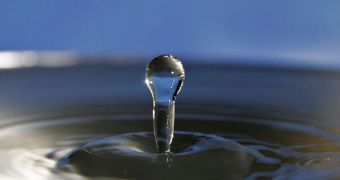Though it covers three quarters of the planet, and makes up more than 70 percent of our bodies, water is still very little understood in comparison to what experts are discovering it can do. Recent discoveries are beginning to indicate that we don't really know that much about it.
While the chemical has a relatively straightforward type of behavior when under normal conditions, it immediately begins to act up if you lower its temperature to 4 degrees Celsius. The weird pattern of action it displays solely at this temperature is called the water anomaly.
Then there's the issue of how it interacts with electricity. Everybody knows that current readily flows through water, but not many people know that the chemical can literally form a bridge between two containers when a high-voltage current is applied to it.
Experts with the University of Technology in Austria used two beakers filled with liquid water for their experiments. When electricity was ran through the water, the chemical simply raised out of each beaker, and extended over open space to connect with water from the other.
Additionally, it was only recently that investigators discovered that regular saltwater, as found in Earth's oceans, can burn like fuel when excited with a certain radio frequency. The applications for such a finding are remarkable.
For example, scientists may finally develop a method of taking advantage of the massive amounts of water we have laying around, to create a renewable method for producing electricity. This is being attempted for years, but with little success.
In other interesting twists, Mars proved that waters can remain liquid at temperatures between minus 100 and minus 70 degrees Fahrenheit. Here on Earth, other experts have shown that the chemical can remain in a solid state even at temperatures as high as 108 degrees Fahrenheit.
Many of the unique physical and chemical properties water displays come from the predominant hydrogen-hydrogen bonds the stuff is based on. However, these are not enough to explain some of the most peculiar behavior it exhibits.
Similarly, these connections do not explain the many types of ice water can create, depending on the temperature and pressure in its environment. Some of these types of ice – as found for example on Saturn's moon Titan – are harder than granite, Daily Galaxy reports.
In recent years, scientists have taken a renewed interest in water. Just a couple of weeks ago, a team of researchers found that the stuff tends to defy the laws of physics at the nanoscale, where it prefers to enter a nanotube, if given the chance.
What is clear at this point is that more work is needed in order to establish why water behaves the way it does.

 14 DAY TRIAL //
14 DAY TRIAL //